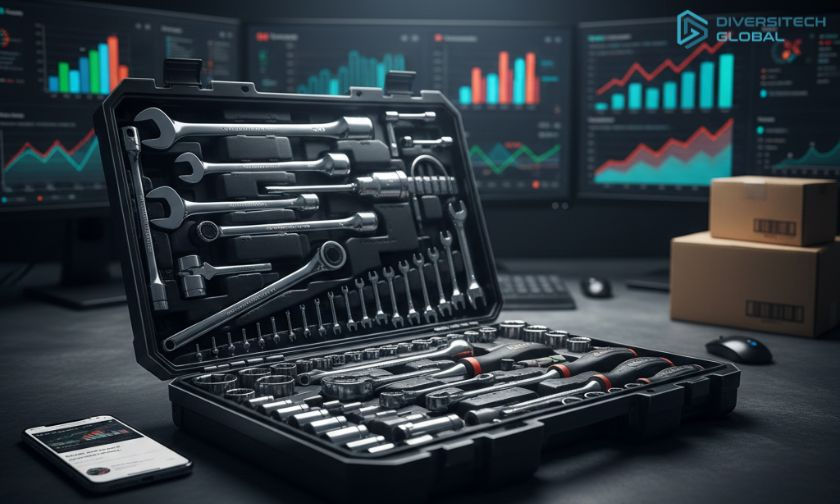Regulatory Requirements for Indian DIY Tool Manufacturing
- Diversitech Global

- Jul 15, 2024
- 6 min read
Updated: Aug 9, 2024

In the fast-evolving landscape of DIY Tool Manufacturing in India, adherence to regulatory requirements is essential for ensuring quality, safety, and compliance. Understanding and navigating the regulatory framework set forth by key bodies such as the Bureau of Indian Standards (BIS), Directorate General of Foreign Trade (DGFT), and Ministry of Commerce and Industry is crucial for manufacturers in this sector.
This blog post will delve into the specific regulations governing DIY tool manufacturing in India, covering aspects such as quality standards, import and export regulations, and environmental and safety guidelines. By exploring the steps to ensure compliance, penalties for non-compliance, and the role of regulatory adherence in business sustainability, manufacturers can stay ahead of the curve in this dynamic industry. Additionally, insights into the future of regulatory environment, potential changes, and the influence of global trends will provide valuable foresight for preparing for upcoming regulatory shifts. Stay tuned as we unravel the intricate web of regulatory requirements shaping the Indian DIY tool manufacturing sector.
Key Regulatory Bodies and Their Roles
To ensure compliance with regulatory requirements in the Indian DIY tool manufacturing industry, it is crucial to understand the roles and responsibilities of key regulatory bodies. This section will provide an overview of the primary regulatory bodies and their functions in governing the industry.
Bureau of Indian Standards (BIS)
The Bureau of Indian Standards (BIS) plays a pivotal role in setting and enforcing quality standards for various products, including DIY tools. This section will delve into the functions and responsibilities of BIS, including the formulation of standards, certification processes, and surveillance activities. It will also explore the specific standards applicable to DIY tools and the process of obtaining the BIS certification mark.
Directorate General of Foreign Trade (DGFT)
The Directorate General of Foreign Trade (DGFT) regulates the import and export of goods in India. This section will focus on the role of DGFT in governing the import and export of DIY tools, including licensing requirements, restrictions, and procedures. It will also discuss the documentation and compliance requirements for manufacturers engaging in international trade.
Ministry of Commerce and Industry
The Ministry of Commerce and Industry is responsible for formulating policies and regulations to promote trade and industry growth in India. This section will highlight the ministry's role in shaping the regulatory landscape for the DIY tool manufacturing industry. It will discuss the initiatives, policies, and incentives introduced by the ministry to support manufacturers, promote innovation, and ensure compliance with international standards.
Other Relevant Regulatory Bodies
Apart from BIS, DGFT, and the Ministry of Commerce and Industry, there may be other regulatory bodies that impact the DIY tool manufacturing industry. This section will explore additional regulatory bodies and their roles, such as the Central Pollution Control Board (CPCB) for environmental regulations, the Occupational Safety and Health Administration (OSHA) for workplace safety, and the Consumer Protection Act for consumer rights and product liability.
Understanding the roles and responsibilities of these key regulatory bodies is crucial for manufacturers in the Indian DIY tool industry. By familiarizing themselves with the functions and requirements set forth by BIS, DGFT, the Ministry of Commerce and Industry, and other relevant bodies, manufacturers can ensure compliance and navigate the regulatory landscape effectively.
Related Article: Key Trends in DIY Tool Manufacturing in India
Regulations Specific to DIY Tool Manufacturing
Specific regulations govern the manufacturing of DIY tools in India to ensure product quality, safety, and compliance. This section will delve into the key regulations that manufacturers in the DIY tool industry must adhere to.
Quality Standards and Certification
Maintaining high-quality standards is crucial for DIY tool manufacturers to meet customer expectations and ensure safety. This section will explore the quality standards set by the Bureau of Indian Standards (BIS) for DIY tools, including specifications related to material quality, dimensions, performance, and labeling. It will also discuss the process of obtaining BIS certification and the significance of the BIS certification mark for DIY tool manufacturers.
Import and Export Regulations
For manufacturers engaged in the import and export of DIY tools, compliance with relevant import and export regulations is vital. This section will provide an overview of the import and export procedures, documentation requirements, and restrictions imposed by the Directorate General of Foreign Trade (DGFT). It will also discuss customs duties, tariffs, and other trade-related considerations that manufacturers need to be aware of when importing or exporting DIY tools.
Environment and Safety Regulations
Manufacturers in the DIY tool industry must also comply with environmental and safety regulations to ensure the well-being of workers and minimize the impact on the environment. This section will explore the environmental regulations imposed by the Central Pollution Control Board (CPCB) and other relevant authorities. It will cover aspects such as waste management, pollution control measures, and compliance with environmental norms. Additionally, it will discuss the occupational health and safety regulations that manufacturers need to adhere to in order to provide a safe working environment for employees.
Intellectual Property Rights (IPR) Protection
Protecting intellectual property rights is crucial for manufacturers in the DIY tool industry to safeguard their innovations and prevent unauthorized use of their designs or technologies.
This section will discuss the importance of IPR protection and the procedures for obtaining patents, trademarks, and copyrights. It will also highlight the role of the Intellectual Property Office in facilitating the registration and enforcement of IPR in India.
Packaging and Labeling Requirements
Proper packaging and labeling of DIY tools are essential to provide consumers with relevant information and ensure product safety. This section will explore the packaging and labeling requirements imposed by regulatory bodies, including guidelines for product labeling, warnings, usage instructions, and safety symbols. It will also discuss the significance of complying with these requirements to avoid legal consequences and build consumer trust.
By understanding and complying with these specific regulations, DIY tool manufacturers can uphold product quality, safety, and compliance. Adhering to quality standards, import and export regulations, environmental and safety guidelines, intellectual property rights protection, and packaging and labeling requirements will not only ensure regulatory compliance but also enhance the reputation and competitiveness of manufacturers in the industry.
Related Article: The Ultimate Guide to DIY Tool Manufacturing in India
Compliance with the Regulations
Compliance with the regulatory requirements in the Indian DIY tool manufacturing industry is crucial for manufacturers to ensure the quality, safety, and legality of their products. This section will provide insights into the steps manufacturers can take to ensure compliance, the penalties for non-compliance, and the role of regulatory adherence in business sustainability.
Steps to Ensure Compliance
Complying with the regulatory framework requires manufacturers to implement certain measures and processes. This section will outline the steps manufacturers can take to ensure compliance with quality standards, import and export regulations, environmental and safety guidelines, intellectual property rights protection, and packaging and labeling requirements. It will discuss aspects such as conducting regular quality checks, maintaining documentation, establishing internal control systems, and fostering a culture of compliance within the organization.
Penalties for Non-compliance
Failure to comply with regulatory requirements can have severe consequences for manufacturers in the DIY tool industry. This section will shed light on the penalties and consequences that manufacturers may face for non-compliance. It will discuss legal repercussions, fines, product recalls, damage to reputation, and potential loss of business opportunities. Understanding the potential penalties will emphasize the importance of compliance and encourage manufacturers to prioritize regulatory adherence.
Role of Compliance in Business Sustainability
Compliance with regulatory requirements extends beyond mere legal obligations; it plays a crucial role in ensuring the sustainability and success of a business. This section will explore how compliance contributes to business sustainability in the DIY tool manufacturing industry. It will discuss the positive impact of compliance on brand reputation, customer trust, access to markets, and long-term profitability. Additionally, it will highlight how compliance can foster innovation, drive continuous improvement, and enhance competitiveness in the industry.
Training and Education for Compliance
To achieve and maintain compliance, manufacturers need to invest in training and education for their employees. This section will discuss the importance of providing training and education on regulatory requirements, quality control, safety practices, and environmental management. It will explore various training methods, such as workshops, seminars, and online courses, and emphasize the role of employee awareness and competence in ensuring compliance.
Collaboration with Regulatory Bodies and Industry Associations
Collaboration with regulatory bodies and industry associations can significantly support manufacturers in achieving and maintaining compliance. This section will highlight the benefits of engaging with regulatory bodies and participating in industry associations. It will discuss how manufacturers can actively seek guidance, stay updated on regulatory changes, and contribute to shaping industry standards and regulations through constructive collaboration.
By following the steps to ensure compliance, understanding the potential penalties for non-compliance, recognizing the role of compliance in business sustainability, investing in training and education, and fostering collaboration with regulatory bodies and industry associations, DIY tool manufacturers can navigate the regulatory landscape effectively and build a solid foundation for long-term success.
Related Article: 10 Reasons Why You NEED to Shift Your DIY Tool Supply Chain to India




I am very honored to see this article of yours, thank you very much.
dubai business events and conferences